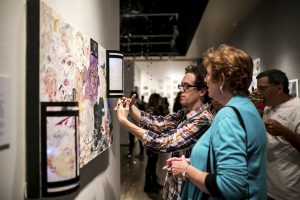
The Association of American Colleges & Universities (AAC&U) announced that two College of Arts & Humanities departments were awarded grants of the twenty-four given nationally by The Endeavor Foundation. The two organizations recognized a total of 22 universities for civic learning and democratic engagement. Keri Watson, assistant professor of art history from the School of Visual Arts and Design (SVAD) and Amanda Snyder, lecturer from the Department of History applied for these mini-grants to advance their departments.
SVAD offers twenty-five art history courses on western and non-western art from the ancient to contemporary periods. “Although our courses address civic responsibility through discussion of topics such as cultural patrimony and hegemony, the susceptibility of art to loss due to war, terrorism, and neglect, and art and activism, we would like to better align our course learning objectives across the major. Civic learning and social responsibility are integral to each student’s curricular experience,” says Dr. Watson. The mini-grant will fund a faculty retreat where three of SVAD’s art historians, Margaret Ann Zaho, Ilenia Colón Mendoza and Watson will revise course learning objectives and student learning outcomes to integrate civic engagement into each offered course. They will also create a capstone experience that requires students to reflect on the role of art in society and the relationship between art history and public engagement. Additionally, the three historians plan to host a lecture series addressing Art and Activism, Art as an Endangered Species, and Feminist Art and the Guerilla Girls, tentatively scheduled for September 7, September 21, and October 5.
Snyder hopes to use the mini-grant to promote the Civics Literacy Program within the Department of History and the UCF community. She plans to set up workshops to discuss studies and articles and start reviewing course syllabi with state requirements. “We’ll be looking to take advantage of both our Public History Program’s local connections as well as my own work with digital teaching tools (as a fully online instructor) to create some interactive activities for students,” Snyder says. “We want to promote those community connections and projects with more hands-on engagement for students of how systems work and how they can change or affect those systems. To be cliché, to ‘make history come alive’ in [the students’] modern world, and teach them the importance of being active citizens; that they, too, are significant historical actors.”
Read more about the awards on the AAC&U site here.